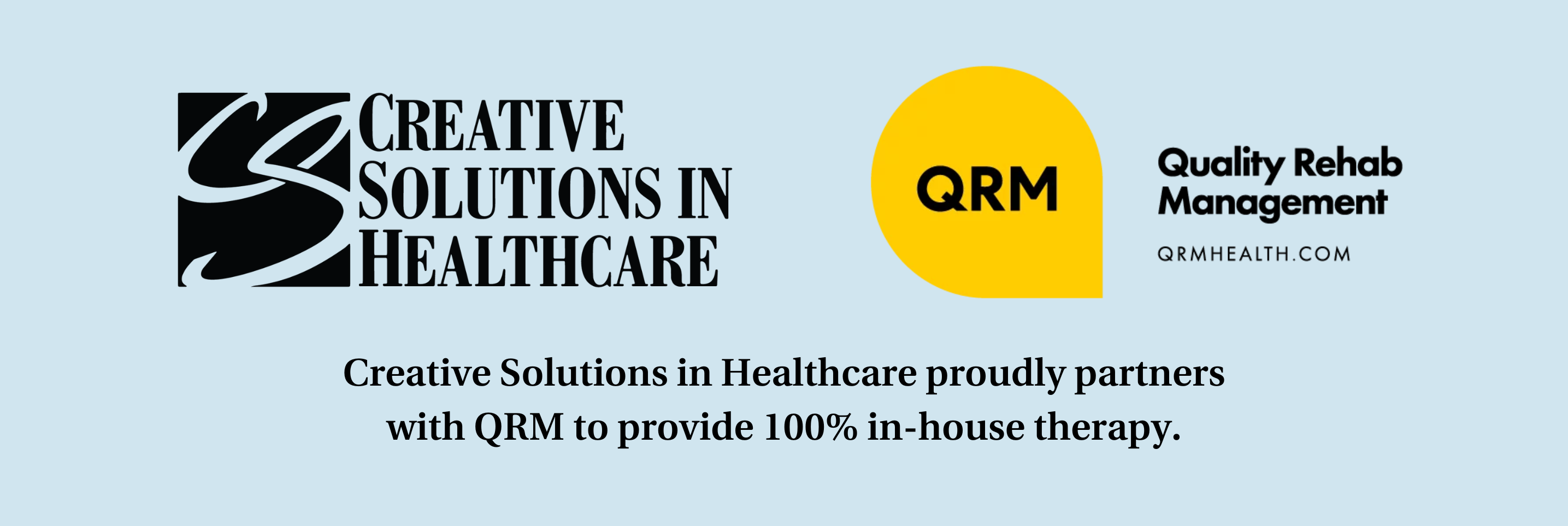Speech Therapy
What is Speech Therapy and How Can it Help You
What is Speech Therapy?
Speech Therapy, also known as speech language pathology, is a form of rehabilitation that aims to improve communication, cognitive ability, and memory for people of all ages. This type of therapy goes beyond just speech improvement- it also involves the brain and muscle groups used for tasks such as reading, writing, swallowing, eating, memory recollection, and more.
This type of therapy can be beneficial for those looking to improve communication and fluency, and, along with physical and occupational therapy, speech therapy also plays a key role in helping patients regain their independence.
Speech Therapy in Skilled Nursing Facilities
Speech therapy plays an important role in the care provided in skilled nursing facilities. It can support residents recovering from strokes, brain injuries, surgeries, or those managing chronic conditions affecting their speech, language, or swallowing abilities.
In skilled nursing facilities, speech-language pathologists (SLPs) work closely with residents to develop treatment plans based on their unique needs and therapy goals. For residents aiming to return home, therapy might focus on regaining specific communication or swallowing functions. For long-term residents, the focus may be on maintaining current abilities and preventing further decline. The goal is to ensure residents have the tools and support needed to communicate effectively, live comfortably, and maintain their quality of life.
Key Benefits of Speech Therapy
Improves Communication Skills
Speech Therapy helps individuals improve their ability to communicate effectively, which includes speaking clearly, understanding spoken and written language, and using social communication skills. Speech-language pathologists use a variety of techniques tailored to each resident’s needs.
These may include articulation exercises, language activities, and teaching the resident other ways of communicating aside from verbally. By improving these skills, residents can express themselves more confidently and participate in social interactions, giving them more independence and improved relationships with others.

Managing Medical Conditions
Speech Therapy also helps manage medical conditions and a variety of disorders that affect communication and swallowing abilities. These can include neurological conditions, cognitive impairments, and swallowing disorders, all of which significantly impact a resident’s quality of life.
Speech therapy involves treatment plans to address the specific needs of each resident. For instance, therapy might include exercises to improve articulation and speech for those with neurological impairments, memory and attention building activities for individuals with cognitive issues, and swallowing techniques and dietary adjustments for those with dysphagia.
By working to address all needs, speech therapy can help residents to regain lost functions and also prevent further decline or future difficulties.
Enhances Quality of Life
The ultimate goal of speech therapy is to improve the quality of life for residents. Communication skills are crucial for maintaining social connections and emotional well-being. Expressing needs, thoughts, and ideas effectively will keep residents happier overall and with less frustration.
Also, properly managing swallowing disorders, chronic conditions, or cognition issues can help residents to feel more in control in their recovery. Through exercises, activities, and support strategies, SLPs help give residents the tools they need to feel more independent and engaged in their skilled nursing environment.
Inside CSNHC’s Partnership with QRM
Creative Solutions in Healthcare is committed to providing the best quality of care, and we do this with our in-house therapy team and with our partnership with QRM, an organization that aims to improve patient outcomes and provide the needed support to skilled nursing facilities.

Support, Education, and Resources
QRM’s top priority is aiding and advocating for our entire rehab team, including our speech language pathologists. QRM’s team provides on-site regional support, ensuring our therapists have all they need to be successful. They follow through with this support by providing weekly operational calls, facility visits, and regular training from clinical specialists. This allows our therapists to stay up to date with any advancements or necessary information.
QRM also plays a big role in creating a positive therapy environment. They are big supporters of highlighting resident success, and they encourage our facilities to celebrate therapy milestones and achievements among residents.
Another helpful resource for our therapy team is QRM Universities, which provide comprehensive training specific to skilled nursing and long-term care environments. Through a variety of courses across every level of the therapy industry, this training ensures every therapist has the knowledge and resources to be prepared to enter this environment.
Therapy Outcomes
QRM uses various methods to track therapy outcomes. They carefully review therapy records and follow along with the residents’ therapy journey to look for continued improvement. Whether the resident’s goal is to discharge to home or to regain movement and functionality, success is measured by how and when these goals are met.
With specific data, such as resident ability, risks, cognitive levels, etc., this partnership allows us to plan more individualized treatment plans and better track resident progress throughout their therapy journey.
Our partnership with QRM is not only about enhancing clinical outcomes but also about improving the overall well-being of our residents.
Resident Benefits
Our partnership with QRM, rooted in shared goals and values, promotes a supportive environment that benefits both our facilities and our residents. By working together, we can ensure consistency in our therapy procedures and also better serve our residents’ needs.
QRM’s clinical programs are designed to promptly address impairments, identify skilled needs, and maintain residents’ functional levels. Through a combination of creative interventions and enjoyable group activities, therapy sessions become a big part of enhancing a resident’s quality of life and maintaining their independence.

How to Know if You Need Physical Therapy
Challenges with Communicating
Speech therapy may be beneficial if you or a loved one is experiencing difficulty speaking, understanding language, reading, writing, etc. These communication challenges can be a result of various conditions such as a stroke, brain injury, or a developmental disorder. Speech therapy can provide help addressing these specific issues to help individuals regain or improve their communication abilities.
Difficulties with Eating and Swallowing
Some difficulties can include consistently coughing or choking during meals or unexplained weight loss, both of which can be a sign of Dysphagia, which is a disorder largely characterized by the inability to swallow properly. This can be caused by certain neurological conditions, illnesses, or muscle weakness in relation to aging. If eating and swallowing have become increasingly difficult for you or a loved one, an SLP can evaluate the reasons why and create a treatment plan including swallowing exercises, diet modifications, or safe eating strategies.
Issues with Cognitive Communication
Problems with memory, attention, or problem-solving that impact daily life may indicate a need for speech therapy. These types of issues are often seen in those with dementia, brain injuries, or other cognitive impairments and they can have a serious effect on the individual’s well-being. If you or a loved one begins to face challenges with communicating properly, recalling information, or focusing on daily tasks, speech therapy may be beneficial. SLPs can offer cognitive exercises and strategies to enhance these skills, helping individuals maintain their independence and function at their highest level.

How Do I Find a Qualified Speech Therapist Near me?
Speech therapy plays an important role in helping people better communicate and experience a higher quality of life. Whether it be for daily support in a long-term care setting, or for help reaching specific recovery goals, speech language pathologists in skilled nursing facilities are dedicated to improving all aspects of a resident’s well-being.
If you or a loved one is in need of speech therapy, click here to locate a facility providing speech therapy near you.
